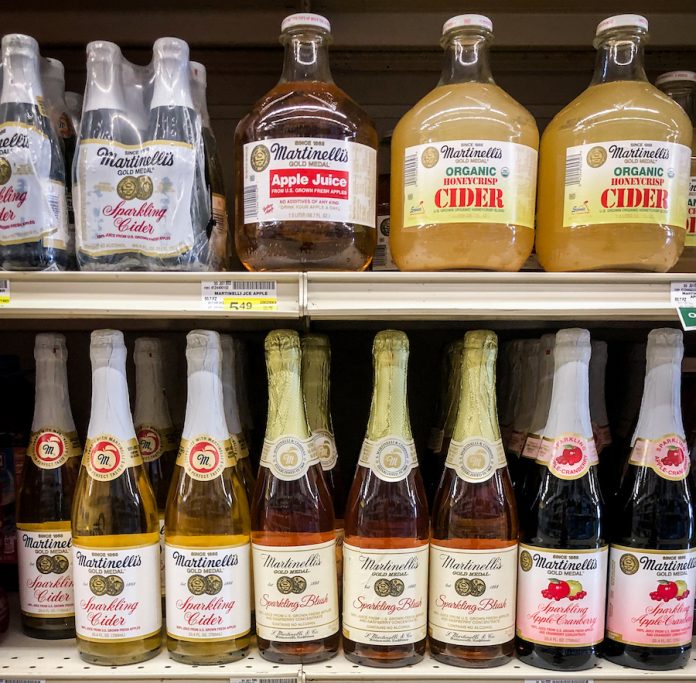WATSONVILLE—When the nonprofit Defend Our Health tested bottle caps from 141 beverage brands, they found potentially harmful chemicals in more than a third of them. Two Martinelli’s products were among these brands, but the Watsonville-based apple juice and cider company says it is now in the process of addressing the issue.
Defend Our Health worked with the Campaign for Healthier Solutions to collect and test 273 glass bottle caps for phthalates and vinyl plastics.
“We’re a national campaign that’s been doing work on toxics in dollar store products for six years,” said José Bravo, the national campaign coordinator for the Campaign for Healthier Solutions. “We’re focusing on communities of color, and low-income communities that are already overburdened by toxics.”
The two families of chemicals tested—phthalates and vinyl—make plastics softer and more pliable. The flexibility helps create tight seals in bottle caps and closures. But it comes with health risks. High levels of phthalates are linked to reproductive and developmental problems, as well as skin irritation and cancer.
Starting in January of 2022, the state of Maine will not allow the sale of food or beverage products with phthalates in the packaging. A similar ban will take effect in Vermont in 2023.
Vinyl plastics, also known as PVC or polyvinyl chloride, can negatively affect both human health and the environment.
“There are toxic chemicals, like phthalates and other additives, that can escape from the [vinyl] plastic during use. And then it also causes problems upon disposal,” said Mike Belliveau, the executive director of Defend Our Health.
“The hazards of these chemicals have been well-known for many years,” he said. “Unfortunately, the federal agency that is responsible—the U.S. Food and Drug Administration—is asleep at the switch when it comes to toxic chemicals in food and beverage packaging. And that’s why it’s critical that market leaders show the way…”
After testing the bottle caps, the group reached out to the companies and offered to discuss alternatives. Several of the manufacturers said they didn’t know their packaging contained phthalates or vinyl.
“Many of those brands did engage with us, and I’m happy to report that a number of them immediately switched to phthalate-free and vinyl-free alternatives,” Belliveau said.
Martinelli’s did not respond to emails and a letter from the group, which Belliveau and Bravo both found surprising.
“My kids grew up drinking Martinelli’s,” Bravo said. “This is not about boycotting a product or getting people to say no to drinking Martinelli’s cider and juices. It’s about having the retailers do the right thing.”
The company did take note, despite the lack of communication.
“It actually prompted us to—back in the late fall—start looking at this,” said Mark Mizuki, the director of operations for Martinelli’s. “We weren’t quite sure—and I’ll take full responsibility—who these people were. But in hindsight, we probably should have contacted them and talked to them.”
Instead, the company reached out to its suppliers directly. One responded that their packaging did contain small amounts of phthalates, so Martinelli’s began working with them to create and test an alternative.
“As of June, we have a viable solution, and we converted to non-phthalate,” Mizuki said. “So everything they’re shipping us as of last month is non-phthalate.”
Finding an alternative to the vinyl seal used in one style of glass jug has proved more challenging. During testing, the company saw increased failures in the seals of non-vinyl options. The high carbonation and intense pasteurization process Martinelli’s uses might be to blame, Mizuki says.
“Because we don’t use spoilage preservatives in our juice, after we fill the bottles we do a post-fill pasteurization where we basically use time and temperature to shower the bottles,” Mizuki said. “We lean heavily to the cautious side and probably tend to over-pasteurize a bit, which drives the [internal pressure] up.”
The company is working with current suppliers and talking with two new suppliers about the issue.
“Pre-pandemic, we probably would have had people pouring through our door offering options,” Mizuki said. But the stress on supply chains slowed the testing process and limited options, he added.
If the brand can’t find a non-vinyl solution, it might change the formulation of the world-famous juice. But Mizuki says that’s a last-resort option.
“We haven’t found the right solution yet, but we continue to work through it,” he said.








